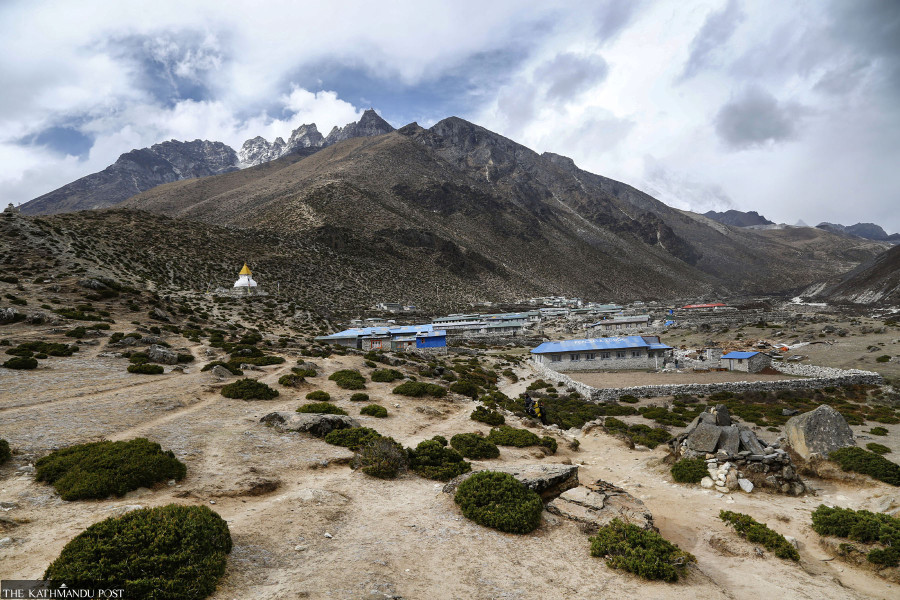Columns
People, mountains and climate change
Urgent delivery of adequate and accessible funds is needed for science-based, locally-led climate actions.
Popular Gentle
The Government of Nepal is hosting an international dialogue titled “Mountains, People, and Climate Change” on May 22-23, 2024, in Kathmandu. The event aims to strengthen coordination and prioritise mountain-centric priorities and actions within the broader context of climate change. By convening mountain-based scientists, policymakers and practitioners, this dialogue will drive the ongoing efforts to position mountains as a pivotal element of the global agenda and as a key negotiation block within the United Nations Framework Convention on Climate Change (UNFCCC).
Mountains are critical to both nature and humanity, offering essential ecological services. They are home to 15 percent of the global population and nearly half of the world's biodiversity hotspots. More than a third of the global population depends on freshwater sourced from mountains, with the Himalayan region alone supplying water to approximately 240 million people living in mountainous areas and over 1.6 billion people downstream. These regions deliver unique ecosystem services, including provisioning (food, water, medicines, energy), regulating (air quality, carbon storage, water filtration, pollution and disease control), supporting (habitat for wildlife, nutrient cycling) and cultural (tourism, recreation, education, spiritual well-being and indigenous knowledge).
Despite their global significance, mountains face unprecedented environmental threats, primarily from climate change, air pollution, heat, drought, erratic rainfall and snowfall patterns. The rate of warming in mountain areas is disproportionately higher than in the plains. Projections indicate that the average temperature in the mountains could rise by over 1.8 degrees Celsius by 2050, while global efforts aim to cap warming at 1.5 degrees Celsius by the end of this century. Additionally, glacial lake outburst floods pose perennial threats, with current emission pathways suggesting that 80 percent of the glacier’s volume could disappear by 2100. Over two-thirds of indigenous mountain species are at risk of extinction, and mountain economies, which heavily rely on climate-sensitive sectors like agriculture, tourism and hydropower, are particularly vulnerable.
The latest Intergovernmental Panel on Climate Change assessment report confirms that climate change and climate-induced disasters negatively impact mountain livelihoods, leading to resource degradation, declining production and the displacement of people, along with their cultural heritage and practices. Losses and damages, which are inevitable and unequally distributed, disproportionately affect developing countries and vulnerable groups such as low socio-economic classes, migrant groups, the elderly, women and children.
Given their vulnerability, it is urgent and imperative to prioritise the mountain agenda in global climate change discussions to ensure the provision of resources, capacity and technology. Although global advocacy for mountains has gained momentum through various initiatives, like the “Mountain Partnership,” this agenda has yet to be fully acknowledged and integrated into global environmental negotiations, including UNFCCC decisions. Mountains and the cryosphere were discussed at COP26, but these discussions could not get momentum to influence decision-making significantly.
Nepal has prioritised mountain and climate change issues since preparing its National Adaptation Programme of Actions (NAPA) in 2010. Building on previous initiatives, the Government of Nepal began systematically advocating for the mountain agenda in national and global forums last year. This advocacy gained momentum following UN Secretary-General Antonio Guterres's visit to Nepal, witnessing the disastrous impacts of climate change on the mountains and calling for immediate action. The agenda has been further pronounced by Prime Minister Pushpa Kamal Dahal in COP28, most notably in the high-level roundtable on “Call of the Mountains: Who Saves us from the Climate Crisis?”, which demanded a dialogue on mountains and climate change.
This concerted effort culminated at COP28—where the importance of mountain ecosystems was acknowledged—led to the decision to hold an expert dialogue on mountains and climate change during the 60th sessions of the UNFCCC Subsidiary Body for Implementation (SBI) and Subsidiary Body for Scientific and Technological Advice (SBSTA) scheduled for June 2024. The expert dialogue will provide space for scientists, policymakers and frontline communities to come together and share knowledge, experience and insights on strengthening the resilience of mountain ecosystems.
Considering the opportunities to accelerate the mountain agenda in the forthcoming 60th sessions of the UNFCCC in June 2024, the Government of Nepal is hosting an international expert dialogue on mountains, people and climate change. Through this dialogue, Nepal aims to strengthen solidarity and prioritise mountain-based actions for climate justice, develop concrete roadmaps and foster collaboration among mountainous countries to address their shared vulnerabilities to climate change. This includes exploring and exchanging knowledge, research, and innovative solutions to promote partnerships concerning technology transfer, capacity development, and climate finance. This initiative aligns with broader goals of justice for nature and the preservation of human civilisation. By addressing these critical issues in a humane and equitable manner, the dialogue seeks to ensure that mountain communities do not bear an undue burden of global environmental changes and can continue to contribute to the richness of our global ecological and cultural landscapes.
Ultimately, the dialogue aims to create a shared platform that not only raises awareness but also promotes collaboration across nations to foster a common understanding and unified position on the pressing issues facing mountainous regions.
Expectations from the mountainous countries for the forthcoming international negotiations are resolutely centred on forging robust partnerships for climate justice. We urge that keeping the global temperature below 1.5 degrees Celsius is vital for mountains, ecosystems and people. Delivering adequate, predictable and accessible funds and technology is urgent to support science-based locally-led climate actions. The full operationalisation of loss and damage funds in a transparent and equitable way is necessary to compensate for economic and non-economic losses in the mountains.
Likewise, we want to see the global and domestic policies and plans put the most vulnerable women, youth, children, disabled people, indigenous people and local communities in the mountains at the priority of climate action. The global community should transform dialogue into decisive action, ensuring that concerted efforts provide sustainable and equitable benefits to all, preserving the delicate balance of mountain environments for future generations.




 22.6°C Kathmandu
22.6°C Kathmandu















